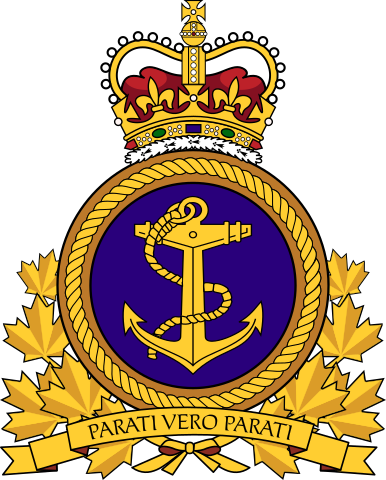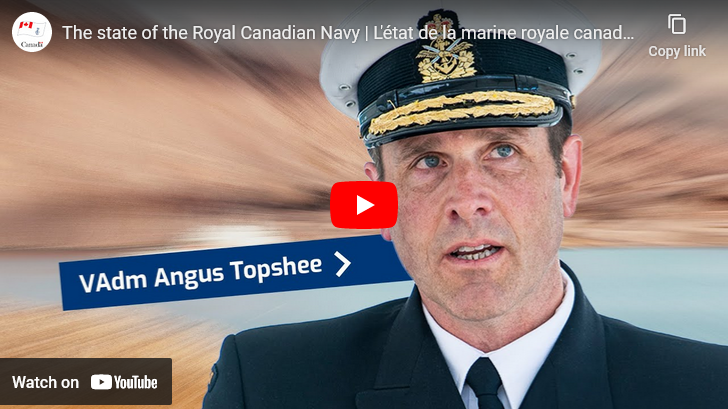Paul Wells was disturbed by a recent extremely downbeat video posted on YouTube by the head of Canada’s Navy so he got in touch with the man himself for an interview:
That was a hell of a video that Vice Admiral Angus Topshee, the Commander of the Royal Canadian Navy, put on Youtube this week. Topshee depicts a Navy in a “critical state”, facing “very serious challenges right now that could mean we fail to meet our force posture and readiness commitments in 2024 and beyond”.
The Navy’s not alone — the Air Force and Army are “confronted with similar challenges”, Topshee says in the video. The biggest challenge is that the Navy’s getting smaller, about 14% smaller today than in 2014. The West Coast fleet is “beset with a shortage of qualified techs” and the fleet can only deploy one of its three offshore patrol vessels at a time. The Halifax-class frigates that form the basis of Canada’s oceangoing capability will need to keep floating for 15 more years, even though they should already have been retired. All of the 12 frigates: Topshee’s political masters have made so many commitments there’s no margin for a reduction in the Halifax-class fleet.
Here’s the video:
To borrow a naval term, it’s quite a broadside. So I emailed Topshee on Wednesday and asked for an interview. He wrote back promptly and we were on the phone within hours. Here’s our interview in Q&A format, edited for length.
PW: Are you in the habit of putting out videos that are this stark in their diagnosis? If I went back, would I find one of these every year?
AT: No, there was a unique combination of circumstances that led to video being produced. The promise I made when I took command of the Navy is that we have to be honest. Things are the way they are. They’re not necessarily the way we want them to be. And we’ve got to be very honest about that difference. And so I’ve tried to be frank, and we try and rebuild trust. And to be completely honest, we went through a cultural crisis in the Canadian Armed Forces. And my feeling is that if you want people to trust you, then you have to be completely open, transparent and honest with them. That’s the approach I’ve taken throughout my tenure in command of the Navy.
PW: Is the fact that this video’s on YouTube a reflection of any difficulty you’re having getting heard internally?
AT: No. I’ve shared my assessments with the leadership of the Department, up to and including this minister and the previous Minister. I feel I’m being heard and respected. This was more about, we wanted to put the message out internally. Unfortunately, there’s some very specific IT challenges around how we disseminate internal messages. And so [Youtube] was the channel we used.
[…]
PW: It’s slower to train up recruits in the Navy, because you have to put them on a ship, and that has logistical implications? Whereas in the army, I could take them to an open field?
AT: The commander of the army is going to hate me for saying this, but it’s always been easier to raise an army than to generate a navy or build an air force. Fundamentally, the basic core tasks of an infantry soldier really come down to those individual capabilities that can be trained relatively quickly. Now, actually commanding and controlling and employing that army is a fantastically complicated thing. But it starts with the infantry soldier: relatively easy to build. The training required to generate a sailor is pretty significant. The Mar-Techs that I talked about? [In the video, Topshee says the navy has been losing a highly-trained marine technician every two days.] You know, we’re talking five to 10 years to get to the level of training and experience that they require. So that’s why, you know, we need to make some immediate changes to stabilize ourselves. To grow back to health is going to take time. If we don’t change the system, it will take virtually forever to get back. So we need to make changes to allow us to accelerate how quickly we can do this. Because the honest truth is that while we’re short sailors at the moment, we would probably actually need more sailors to meet the needs of the future fleet that we’re building right now
PW: On the West Coast, you say you are having to prioritize the Halifax class [the big ocean-going frigates that form the Navy’s backbone] at the expense of the Kingston class [smaller ships primarily for coastal service and patrol].
AT: Historically, the West Coast has always had greater personnel generation problems. Partly because there’s a there’s a smaller personnel footprint over there. So when you’re short a number of sailors you feel it more acutely, because the denominator is smaller. So yes, that’s the coast where we’ve felt the pressures most acutely. We’re seeing similar pressures building on the East Coast, but we have not been forced to make any changes. So what we’ve done is we’ve made sure that we can continue to operate our frigates, because right now the West Coast is deploying two frigates, Ottawa and Vancouver, in the Indo-Pacific alongside Asterix [a supply ship]. We need to sustain that level of commitment to meet the requirements of the Indo-Pacific Strategy.





